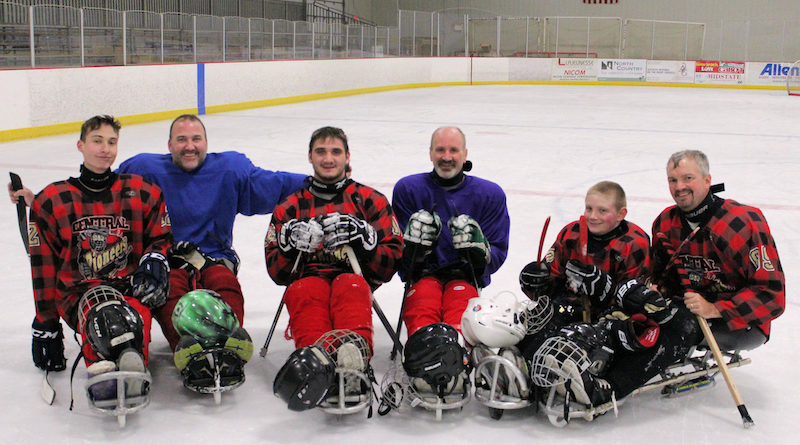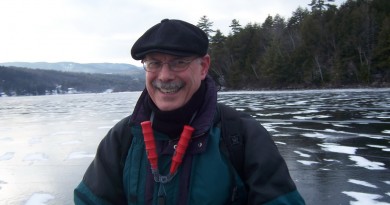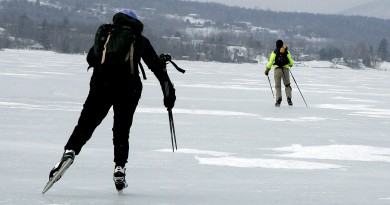The Sled Hockey All-Stars
When three sets of fathers and sons took to the ice, something amazing happened.
The game was tied and in overtime. It was February 3, 2019 and the Central Vermont Pioneers were in Lake Placid, N.Y., to face off on the ice against the Buffalo Sabres Sled Vets at the Empire State Games. The two previous games against that squad had also ended in a tie. After a scoreless first period, Buffalo scored early in the second period, but with three minutes left, the Pioneers scored, tying the game.
Then, in overtime, Jake Lavigne, 23, headed towards the goalie’s left side and slid a wrist shot into the bottom right corner on a pass from his father Ernie, 65, to Rachael Grusse. The Pioneers took home the gold medal.
For a team that was only formed in 2016 and whose players range in age from 10 to 60, it was a remarkable victory. This year was their second straight gold medal win at the Empire State Sled Hockey Championship.
But what made this year’s win even more remarkable is the fact that the team includes three sets of fathers and sons: Richard and Kyler Quelch of East Calais, Troy and Jakob Kingsbury of Waitsfield and Ernie and Jake Lavigne of Barre. In each case, the sons have physical disabilities, but since the league allows each team to have three able-bodied members, the fathers can strap themselves onto sleds and share the sport with their kids.
Sled hockey, also known as sledge hockey, is described by the Northeast Sled Hockey League as “the fast, exciting, rough-and-tumble version of ice hockey played primarily by people with lower limb mobility impairments.” The game is essentially the same as ice hockey, except the players use a sled with two hockey skate blades mounted under a seat. Players also use two sticks. One end of each has a conventional hockey stick blade and the other end has a stainless steel “pick” which can be dug into the ice to propel a player forward. In competitive play, hard checking, raised-puck shooting, and penalty killing are as much a part of sled hockey as they are in stand-up hockey.
Jake Lavigne of Berlin was a soccer player before a 2008 mountain bike accident left him paraplegic. His father Ernie later invited his friend Sandy Craige to the house to talk to his son. The two men had played stand-up ice hockey together before an accident led Craige to sled hockey. Jake admits he hated his first time on the ice. “I thought it was really hard and I quit,” he said, “but they hounded me and soon I really enjoyed it.” Jake has attended the National Sled Hockey Development Camp twice, and has taken part in two National Disabled Sled Hockey festivals.
In addition to sled hockey, Jake started playing wheelchair basketball with a friend. Ernie would get in a chair to join them. Ernie was so ferocious at defending that the friend suggested he try sled hockey. Since Jake didn’t have his driver’s license yet, Ernie was already at all the games and practices, so he strapped on a sled and has been playing ever since. “When we first started I made Jake work really hard,” Ernie admits. “Physically, I was being a bully but I wanted him to realize people would push him and he learned quickly. Now I push him but he just takes the puck and skates away.” Jake agrees that his father’s aggressive playing style helped him. “I’m not afraid to get hit because of him,” he said of his father, who has earned the nickname, “the Hammer.”
Now 22 and working for the Vermont Center for Independent Living, Jake is the Pioneers’ team captain. “It’s a great bonding experience playing with my father,” he said. For Ernie, there is joy in a recent role reversal. Last season, the team travelled to Canada and Jake was not happy with his father’s performance in the first game. “He told me I wasn’t being aggressive enough,” said Ernie “and he was right. I took it to heart and after the second game he told me I had played better.”
Assistant captain Kyler Quelch, 15, previously played for the Burlington-based Vermont Sled Cats. When the Central Vermont Pioneers were formed, he relished the opportunity to play closer to home and his father Rich decided to give the game a try. Rich had never played hockey so he had a steep learning curve. “It’s a really competitive game,” he said. “There is something about players who live with challenges every day and take that mentality onto the ice. It’s something I wanted to be part of.” Last year, Rich had the thrill of providing an assist on a goal scored by Kyler.
Born two months premature, Kyler was diagnosed with cerebral palsy when he was two, but he refuses to let his physical limitations keep him from cycling, skiing, swimming, hunting and fishing. When he was eight years old he had the opportunity to throw out the first pitch at Fenway Park and he followed that up with a stint in the broadcast booth. “I love the thrill of playing a sport that includes everyone,” he said. “Everyone is able to get involved in the action.”
A 17-year-old junior at Harwood Union High School, Jakob Kingsbury was born with spina bifida. He tried a wide variety of sports and loved ice hockey the best, but each of his three seasons playing stand-up hockey resulted in season-ending stress fractures. In 2014, he discovered sled hockey and in 2016 he was nominated to attend the National Sled Hockey Development Camp in Buffalo, New York with athletes from across the country. Jakob is hoping to return to the camp and then try out for the U.S. Development Team or the Junior National Team. He currently serves as co-captain for the Pioneers.
Jakob’s father Troy, a former race car driver, joined the Pioneers this year. Playing hockey had never been on his to-do list and he readily admits that when Jakob stopped playing stand-up hockey he was initially happy to be freed from driving his son to early morning practices. “It’s a different dynamic since most parents just get to watch from the sidelines,” says Troy.
The NESHL, formed in 2005, now includes five teams with roughly 65 players. There are also five New York teams which are not in the league and several club teams including the Burlington-based Sled Cats, the Ice Vets of White River Junction and the Lyndonville-based Sled Dogs. Players range in age from 15 to 60 and include a number of veterans.
As sled hockey becomes more popular, it is getting more play. Last year’s championship game in Lyndonville aired on WDEV, marking the first time a Vermont adaptive sports event was broadcast on the radio.
The fathers and sons urged those with an interest in the game to try out for any of the Vermont sled hockey teams, noting the benefits for all involved. “He’s found something he’s passionate about,” Troy Kingsbury said of his son Jakob, “and that leads to an improved outlook.”
For more about the Central Vermont Pioneers and sled hockey, check out this video:
Featured Photo Caption: The Central Vermont Pioneers: (L-R) Jakob Kingsbury, Troy Kingsbury, Jake Lavigne, Ernie Lavigne, Kyler Quelch and Rich Quelch.



